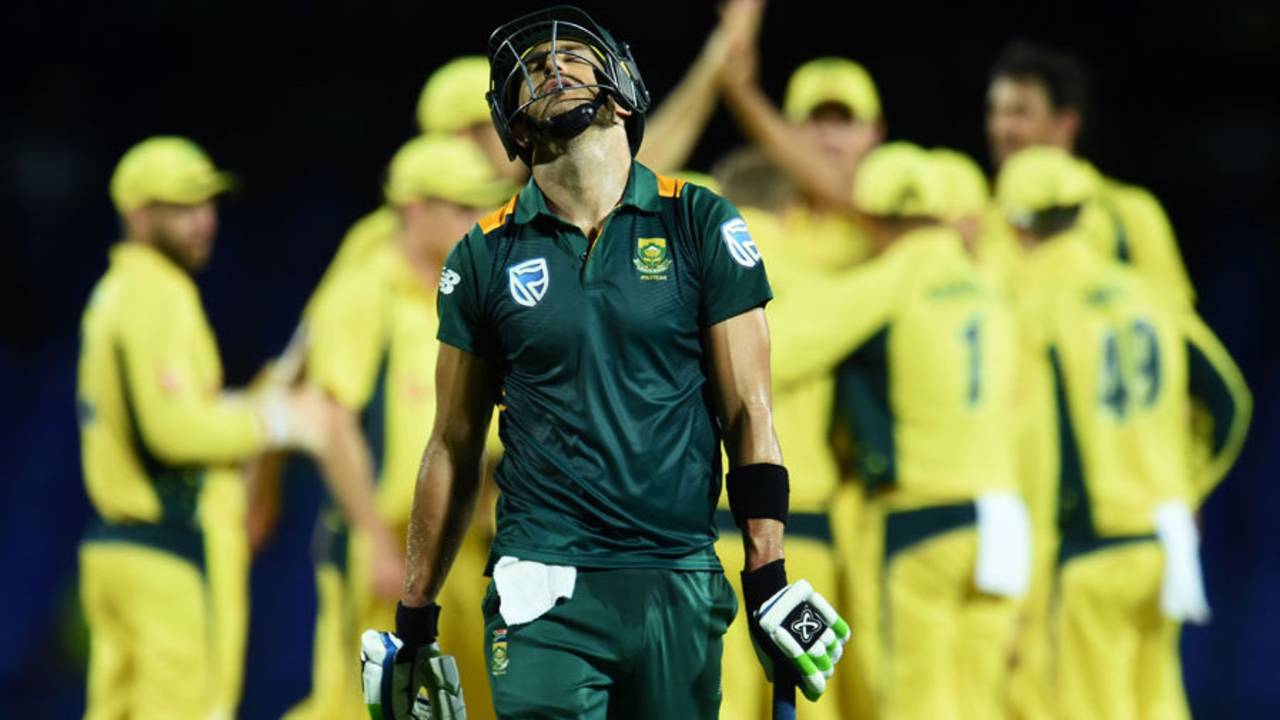South Africa's inability to reach the final of the tri-series in the Caribbean has once again reopened old debates over the team's inability to deliver under pressure. Both Damien Martyn, the former Australia batsman, and Ian Bishop, the former West Indies fast bowler, who commentated on the tournament, pointed to "not getting the mental side of things right," while assessing South Africa's performances for the television show Inside Edge.
"There's great talent there but when it comes to these tournaments, it's just not clicking," Martyn observed. Bishop agreed: "I don't think it's a skill thing. I just think it's a mental thing, where something is blocking them in those pressure situations and that has to take some introspection."
South Africa are no strangers to self-examination, but have been reluctant to using outside assistance. HD Ackerman, the former South Africa batsman who has worked with A teams, felt there was perhaps a case of the national team hiring a mental conditioning coach.
"The one member of coaching staff who fails to appear is a psychologist," he said. "Everyone is saying there is something mentally not right. Let's not attribute that to this group of players because this is something South Africa have struggled with for a number of years. Maybe we need to appoint a full time guy who will say there are some issues here that need addressing."
Ackerman also hinted that lack of confidence and certainty could be the biggest issue behind South Africa's problems. "Australia's young players believe they belong there. Our young players are very unsure when they get into a national side," Ackerman observed. "Do I belong here? Why am I here? Who wants me here? There are a lot of unanswered questions for those players rather than them thinking, 'I belong here'. That's what Australians believe - that they are good enough."
Several board insiders have revealed that there is an underlying feeling of uneasiness as players struggle to understand how they fit into a system that has somewhat been thrown into a state of flux because of the country's transformation policy.
Last year, Cricket South Africa signed a Memorandum of Understanding with the county's sports ministry
underlining its commitment to transformation, which meant an increase in the number of coloured players across all levels. In the 2015-16 summer, franchises increased their targets to six players of colour, of which at least three had to be black African. While the same policy wasn't outlined at the national level, at least one black African player has been fielded in most matches.
Despite that, CSA along with three other federations were
banned from bidding for or hosting major tournaments as sanction for the slow progress of transformation. The ministry explained that it expected 60% of national teams to be of colour, which in cricket translates to seven players in an XI. While CSA has not announced any additional targets at any level, it seems evident that they are applying them anyway.
South Africa had eight players of colour in their squad of 15 for the tri-series in West Indies. All the players brought into the squad - Wayne Parnell, Aaron Phangiso and Tabraiz Shamsi - were of colour, while those left out from the previous ODI squad - David Wiese, David Miller and Marchant de Lange - were not.
Form and merit aside, those included had decent domestic numbers to justify their places and those excluded had been through unremarkable patches.
At the domestic level, there has been major shuffling as franchises have looked to balance their squads. The national team is grappling with exactly the same issue. It's not a case of there not being enough players who are good enough - of colour or not - but it is a matter of making sure there are enough players to fulfill every role the team needs while still meeting targets. It's little wonder that with all that to think about, strategies and game plans appear only half-formed.
For that reason under-fire coach
Russell Domingo may have earned himself a little more time to manage the expectations put on him in both performance and transformation terms. As things stand, Domingo still has 10 months left on his contract and the backing of captain AB de Villiers, even as the public calls for his head.
"To a degree I agree with AB. Sometimes players need to take responsibility, it can't always be about coaching," Ackerman said, as he provided his idea of when South Africans will know Domingo's time is up. "It's so difficult for us to sit on the sidelines and say the head coach is at fault. We don't know the instructions that are being given to players within the dressing room and whether they are being followed.
"If the players aren't doing what the coaches are suggesting it would mean that there is a communication breakdown or a relationship breakdown, then it is time to move on. But if it's just about execution, then either improve or you've got to get new guys in." And one of those new guys may need to be a psychologist."
Firdose Moonda is ESPNcricinfo's South Africa correspondent
